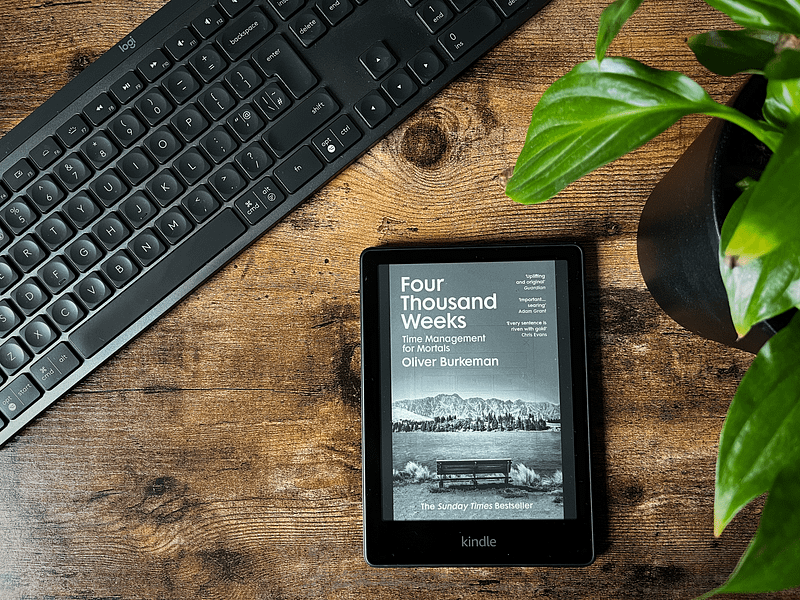The Problem with Productivity: Lessons Learned from ‘Four Thousand Weeks’ by Oliver Burkeman

“By trying too hard to make the most of his time, he misses his life.” — Oliver Burkeman
This quote is one of the most impactful things I have read over the past few years, and is also a quote I believe summarises this book perfectly.
That’s because, despite what internet hustle bros may tell you, there is far more to life than making yourself the most optimised, efficient, productivity machine you can imagine — and Four Thousand Weeks gives you reasons why.
A breathe of fresh air, Four Thousand Weeks flips the script on productivity culture, helping us to focus on what matters today rather than constantly working to tick one more thing off the to-do list.
Who This Book is For
Anybody with a type A personality, who has to squeeze every minute of productivity into their day or optimises for maximum efficiency — but feels they do so at the cost of the truly important things in life. Or simply those who overfill their shopping bag.
Key Insights
Embracing Gratitude
Recently it seems as though the importance of gratitude has increased in popularity, with many self-improvement authors discussing, or at least mentioning, the topic.
In this context, gratitude is discussed in relation to time. More specifically, how we view time negatively, as we compare our lifespans to that of the universe.
This is where Burkeman suggests that the way we approach time is wrong, and that we should instead reframe our view by comparing our lifespans to, well… nothing. Proposing instead that we should feel gratitude for the time we have been given, rather than expecting more.
“It’s the very last thing, isn’t it, we feel grateful for: having happened. You know, you needn’t have happened. You needn’t have happened. But you did happen.” — Oliver Burkeman
The reason I believe this so powerful is because it asks us to consider the other scenario, the one in which you were never born. This small shift in perspective immediately focuses our mind on what we have today — our friends, families, partner, house, food — everything. Focusing the mind on things we have rather than the things we lack.
In my experience, gratitude is one of the fastest, most cost effective ways to be happier immediately, and there are very few occasions where practicing gratitude has not led to increased happiness.
Every single thing we have may never have existed, in fact it was extremely unlikely to begin with. So be grateful, and do everything you can to appreciate what you have. After all, “you needn’t have happened, but you did happen”.
The Problem with Productivity Tools
So, if you’re anything like me you’re likely to be somewhat obsessed with productivity tools/hacks/software — really anything that (in theory) can help in getting more done.
However, one of the book’s key insights is that the tools we use to increase our productivity actually end up causing more stress, anxiety and feelings of busyness — but not because they are ineffective, because they are too effective.
Because these tools work and allow us to be more productive, they make us feel as though we have more time than we actually have — reinforcing the mindset that we can continue to accept new projects indefinitely. But of course this isn’t true.
Productivity tools reinforce the mindset that we can take on more projects, do more things and achieve more goals. But this is problematic because our life is limited, and therefore so are the things we can do within it.
By continuously adding new projects and tasks to the to-do list, we reduce the time we spend on things that genuinely matter because each day is capped at 24 hours.
While new productivity tools may help you feel more productive, this only leads to taking on more work, reducing the window of time which we have to spend on things that truly matter to us.
Quick side note — one possible solution comes from the book Anything You Want by Derek Sivers: When we are offered a new opportunity, consider this: “it’s either HELL YEAH! or no”. This statement works because it is polarising — there is no option for maybe; and so we must choose only the opportunities we are excited by.
Deciding HELL YEAH! or no has a spillover effect into other areas of our lives. By only choosing the things we’re most excited by, we will put more effort in and are subsequently more likely to make progress and succeed because of this.
Ultimately, the chase to find a slightly more efficient productivity tool only leads to us taking on more work — more than we can perhaps handle.
“The problem isn’t exactly that these techniques and products don’t work. It’s that they do work — in the sense that you’ll get more done, race to more meetings, ferry your kids to more after-school activities, generate more profit for your employer — and yet, paradoxically, you only feel busier, more anxious, and somehow emptier as a result.” — Oliver Burkeman
Your Time is not an Instrument
Another insight from this book is how many of us use our time as an instrument, solely to produce something.
We view time as a resource to be used for the greater good — getting through work now so we can have a better life in the future. And, while some level of delayed gratification is good, too much, Burkeman proposes, results in us living mentally in the future — spending our entire lives waiting for the day when we can do what is really important.
But then time inevitably runs out.
“Once time is a resource to be used, you start to feel pressure, whether from external forces or from yourself, to use it well, and to berate yourself when you feel you’ve wasted it.” — Oliver Burkeman
The solution? Pay attention the the present moment, and realise that even the most successful people at this game lose.
As Burkeman suggests, to achieve the highest salary, the most prestigious positions, one must sacrifice the moment, neglecting the present day in the hope that one day it will pay off.
Though nepotism exists, unless you know someone in a position of power, it is very likely that you will have to develop skills and expertise to reach a prestigious job — and this can only be done by going over and above what others are doing.
However doing this will inevitably eat into your personal time. So you have to ask yourself — is the extra money in my bank account worth the reduced time with loved ones that it takes to get there?
Perhaps, for some, it is — though I imagine for many it’s not.
Nothing Matters, and That’s a Good Thing
Throughout our lives as we take on more responsibility, it can be easy to convince ourselves that we matter a great deal.
Whether this comes from a place of necessity (e.g. needing to care for someone) or a place of arrogance (e.g. being overly proud of oneself), it does not matter. Because the sad (or not so sad, as Burkeman proposes) reality… is that we do not matter.
As the responsibilities continue to grow we fabricate our importance, despite overwhelming evidence that in fact, we aren’t quite as important as we think we are.
Even the most influential people throughout history will one day be forgotten — but this is exactly the point.
If the most distinguished human beings ever to have lived will one day be forgotten, what makes us think that our failures, setbacks and mistakes will be remembered?
Once we realise that only those close to us care about what we do, we can put down the burden we’ve unknowingly placed upon ourselves over the years.
“To remember how little you matter, can feel like putting down a heavy burden that most of us didn’t realise we were carrying in the first place.” — Oliver Burkeman (paraphrased)
Summary
Four Thousand Weeks is a book about time management, but not as you’d quite expect — and that’s exactly why you should read it.
In a world of endless striving towards maximum productivity, Burkeman reminds us to take a step back and consider the costs of this approach, along with providing solutions on how to do so.
I wanted to finish this summary with the quote I mentioned at the beginning:
“By trying too hard to make the most of his time, he misses his life.” — Oliver Burkeman
Four Thousand Weeks shows us how to stop making the most of our time, and instead make the most of our lives.
Thank You
If you made it this far thank you — I appreciate you taking the time to read my work and sincerely hope you enjoyed it. If you would like to continue reading, I’ve included a few of my recent articles from my website below. I’d love it if you could check them out!
Thanks again.
Rob
